About two months ago, the creator of the Metro (2033, 2034, 2035) book series, Dmitry Glukhovsky, was put on federal wanted list by the Russian government. The reason, they said, was due to his discrediting of the Russian armed forces. Said discrediting was an Instagram post in which Glukhovsky called upon his home country to cease its invasion of Ukraine.
Now coincidently enough, I was halfway through a long overdue playthrough of the last entry in the inspired video games series, Metro: Exodus. The charge ignited a curiosity, and I halted my playthrough (I was being killed over and over by a mutant bear, so it wasn’t a hardship) and dug out my old copies of the series’ previous entries: Metro: 2033 and Metro: Last Light.
The games were not only easier and less frightening than I remembered—they were far more intriguing and fun than I recalled; with interesting dynamics I was rediscovering for the first time in years. And better yet, I had a greater understanding of both the games’ message and protagonist that grows to embody them.
Beware that the following content contains heavy spoilers, so if you haven’t finished your gameplay, go and do so! And if what I’ve said so far sounds like your kind of entertainment, you can purchase the game through Steam and Xbox.
The Journey Begins
The Metro series follows protagonist Artyom over the course of several years, navigating the Moscow underground inhabited by the remains of the city’s population and the mutated beasts that stalk them. In 2033 this hostile environment has nevertheless reached a tentative equilibrium that is threatened by the emergence of the Dark Ones: tall, black, shadowy creatures that have rendered all who gaze upon them either mad or dead. Artyom is an outlier to this trend, being one of the few to not be driven completely insane in their presence.
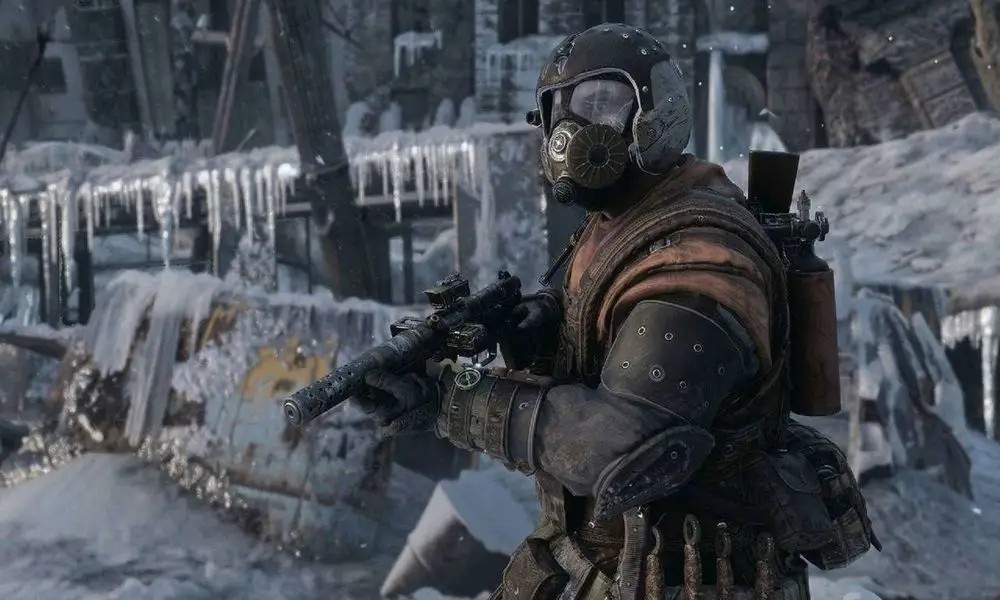
In typical Hero’s Journey style, young Artyom is made to travel miles through abandoned and bustling metro tunnels and over Moscow’s radioactive wintery wasteland surface. He meets new friends, some of whom decide they don’t want to kill him, including the enigmatic, spiritual Khan. And as we follow Artyom, we get to see glimpses of how humanity has both managed to survive (whole villages in tunnels, creative weaponry, inventive foodstuffs) and how it has managed to regress (rampant banditry and slavery, communism and all its historical baggage, and nazism, which needs little explanation).
What truly made me fall in love with the game however, in a way I hadn’t before, is it’s karma system.
Karma is…complicated, at least in 2033. Unlike some other media in which the karma system is incredibly obvious and relatively easy, Metro‘s is incredibly subtle. So much so that it took me a while to even realize what was going on, something I think I missed entirely the first time around (though in hindsight, the constant lens flares sputtering on my screen should have been a dead giveaway) . While the game presents the occasional “good” or “bad” choice directly to the player (say, accepting or refusing a single mother’s few bullets as payment for finding and rescuing her young son) others are shockingly mundane (strumming some notes on a guitar) or unexpected (eavesdropping on a conversation).
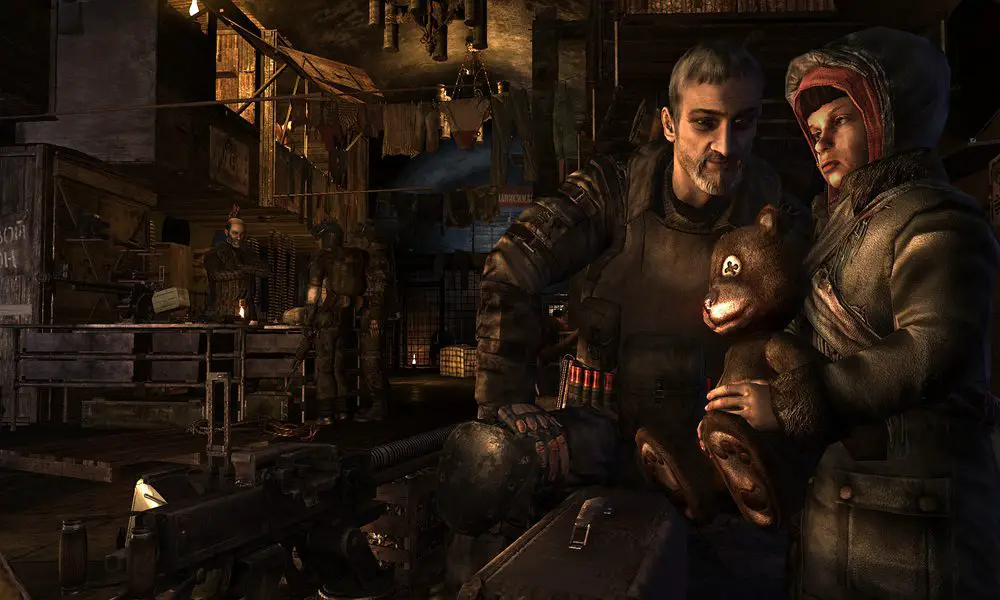
Some options presented to Artyom are incredibly morally interesting. Do you sneak around a couple of soldiers, or do you take them out and rescue the helpless prisoners they’re set to execute, at the cost of your cover? How many get to die for the chance to rescue a few and who appointed you the judge, jury, and executioner of a dozen people’s lives?
Once you get to the game’s end, it becomes increasingly clear why 2033‘s system is so obscured to the player—the canonical ending is technically the “bad” one. After several close calls and with the help of several legendary soldiers known as “The Spartans”, you manage to launch several missiles into the Moscow Botanical Garden, where the Dark Ones make their home.
Arguably, this should be a victory for the humans. Later on, in Last Light, it is treated as such and Artyom is hailed as a hero. But even as the credits begin to roll on 2033, Artyom rightly wonders if he, and by extension Humankind, has done the right thing. Was the “threat” of the Dark Ones ever really a threat to start with? Or did humanity, in typical human fashion, get a glimpse at the unknown and vow to destroy it out of fear?
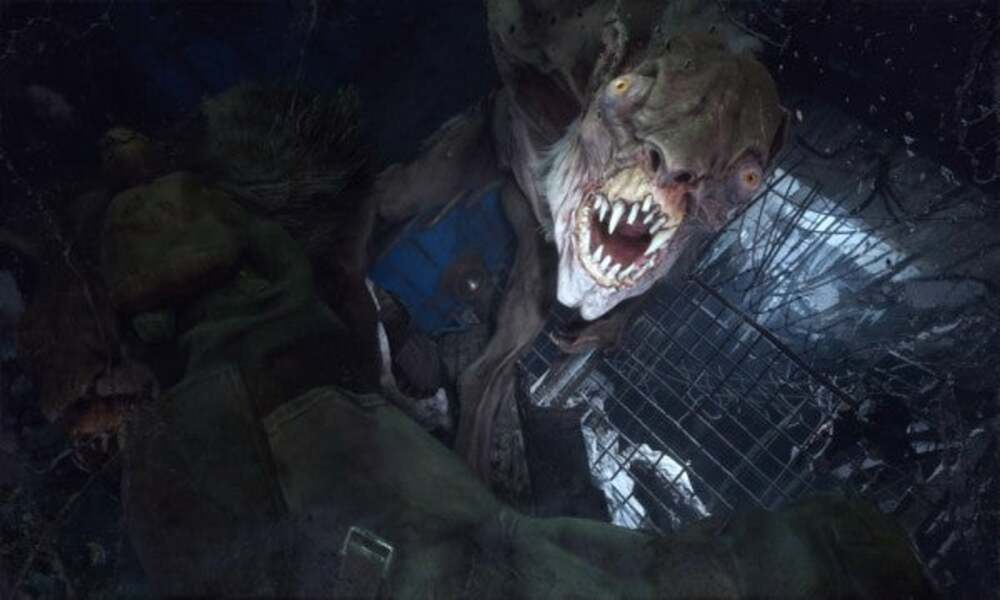
This is the genius of 2033 and why I argue it is probably the best game of the series and one of the greatest games ever made. Artyom has unwittingly been developed and molded into an anti-hero by the end, one feared and hated and pleaded with by the Dark Ones. And it’s not his fault, not really. It’s not even really the fault of The Spartans or their leader, Colonel Miller. It’s not the fault of Hunter, the Spartan whose death first sets you on your path of genocide.
It’s simply the fault of being human. It’s our fault, our society, our fears, and shortsightedness. It’s our ability to lash out, our desire for power, our fear of the unknown.
This isn’t “Would you kindly?”. This isn’t “Only You” playing on the radio. This is a conditioned response of a young man at the near end of the world, following along the desperate path he is told leads to survival. There are some things that can only be understood and fought against with time and experience, and the Artyom we meet in 2033 has such a little chance of doing so, it is practically nonexistent. The only way to “win” is to know the game being played, and neither Artyom nor the player, should they go in blind, have an idea for the most part that they’re even playing.
The Comeback King of the Underground
If 2033 is the story of Artyom becoming an unwitting villain, Last Light is the story of him becoming a redeemed hero.
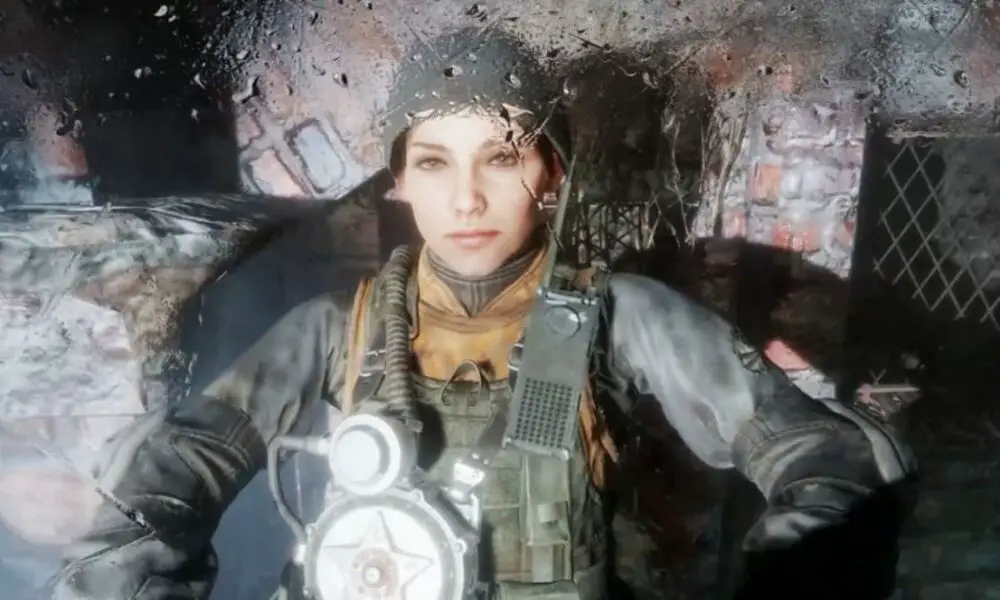
Hailed as a savior, and now a full fledged member of the Spartans, Artyom is nevertheless wracked with guilt over his actions. When it is discovered that one final Dark One survived the Botanical Garden bombardment, Artyom is tasked with hunting it down. With his leader’s bloodthirsty directives on one side and Khan’s impassioned pleas on the other, Artyom tracks down the last Dark One, only to be captured along with it by Nazis.
While 2033 touched on this often, Last Light really leans into the “man is the true monster” angle. When you’re not dodging Nazis, you’re trying to avoid backstabbing Communists gearing up for a full scale invasion and takeover of the Metro, or fighting bandits and raiders. All throughout the game you bear witness to the happenings and aftermath of cruelties and both Artyom and the player (and later the young Dark One you manage to rescue) are made to wonder at the way humanity continues to callously destroy itself even at the end of the world.
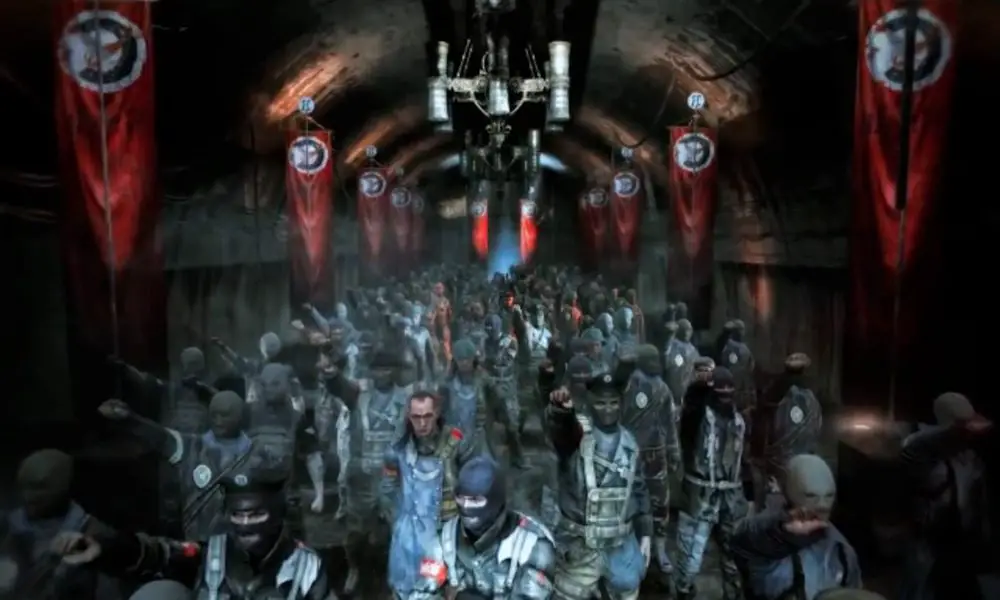
The karma system is made to be a lot less subtle and a lot easier to predict as well. Which, of course, makes sense—much of the first game’s mystery is in direct conjunction with Artyom’s sense of fear and ignorance. He doesn’t necessarily know how to make a quiet moral choice, or how to really appreciate the simplistic creativity inherent to humanity. He’s barely stepped over the threshold of adulthood and in this world, adherence to one’s leaders—unless you have the numbers and guile to somehow rough it alone—is considered paramount to survival. He may occasionally detour, but the Artyom of 2033 is a scared boy drafted into war and wreathed in a mantle of crushing responsibility, one that he only withstands by utmost faith in his elder’s commands.
The Artyom of Last Light is still in many ways a boy, but a boy that has had time to ruminate and absorb a vital lesson: your elders aren’t always wise. It’s okay to question. It’s okay to have doubts. It’s okay to look at the path you’re walking and, should it prove unsuitable to you, walk off it. So it’s with this understanding that Artyom is better equipped to make an informed choice. He’s more patient and willing to emphasize, to stop and listen. He’s more willing to see the people that are supposed to be his enemies, both human and supernatural, and look at them not simply as fodder to be mowed down but people trying to live in a series of systems stacked against them.
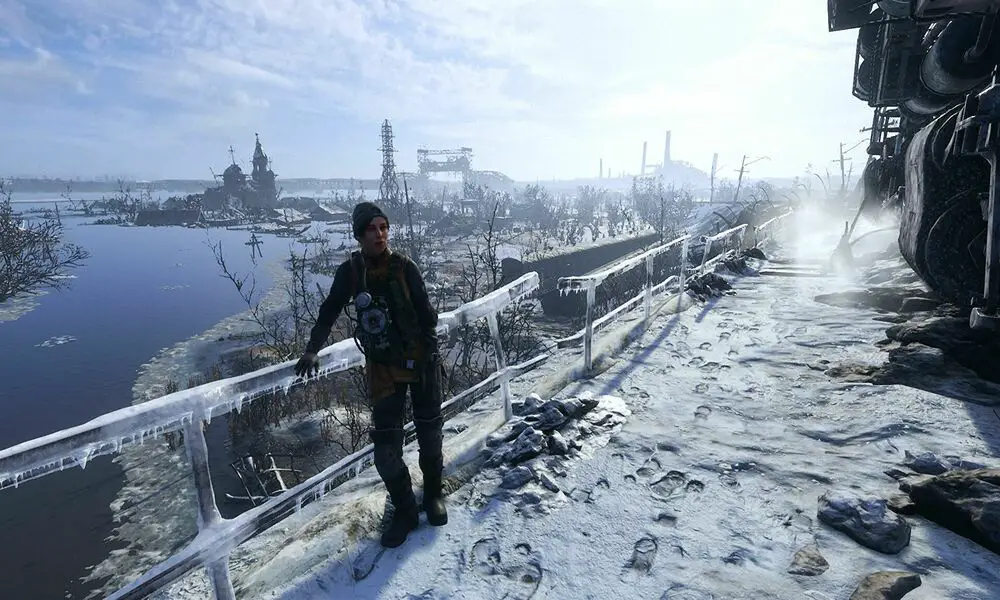
The Foils on Your Shoulder
This maturity is best emphasized when weighed against the Artyom’s narrative foils: the aforementioned Dark One and the communist Red Party soldier Pavel.
The Dark One, of course, serves as the standard for the innocence Artyom has long lost, even before 2033, back when he and his mother was attacked by rats and she was eaten alive. He is naive yet wise in the strange way children tend to be and is—understandably—wary of the man who wiped out his loved ones, but is nevertheless understanding of the fear that drove Artyom to commit the act and the guilt that plagues him. He grieves, but he does not hate, though he has every reason too.
Despite the oddity of their borderline supernatural existence, the Dark One, and all of his brethren, are inherently better beings. They’re willing to fight for their survival, but are also so inherently empathetic that, should Artyom subvert the expectation of being a bloodthirsty, unrepentant, and unreasonable human, the young Dark One rallies his remaining brethren to prevent a massacre by the Communists on the remaining Spartans. Artyom is constantly amazed and we see him, already set on being a better person, fully commit to such in order to honor the Dark Ones, both to redeem himself and reach a state of selfless kindness the Dark Ones so willingly display.
And then there’s Pavel.
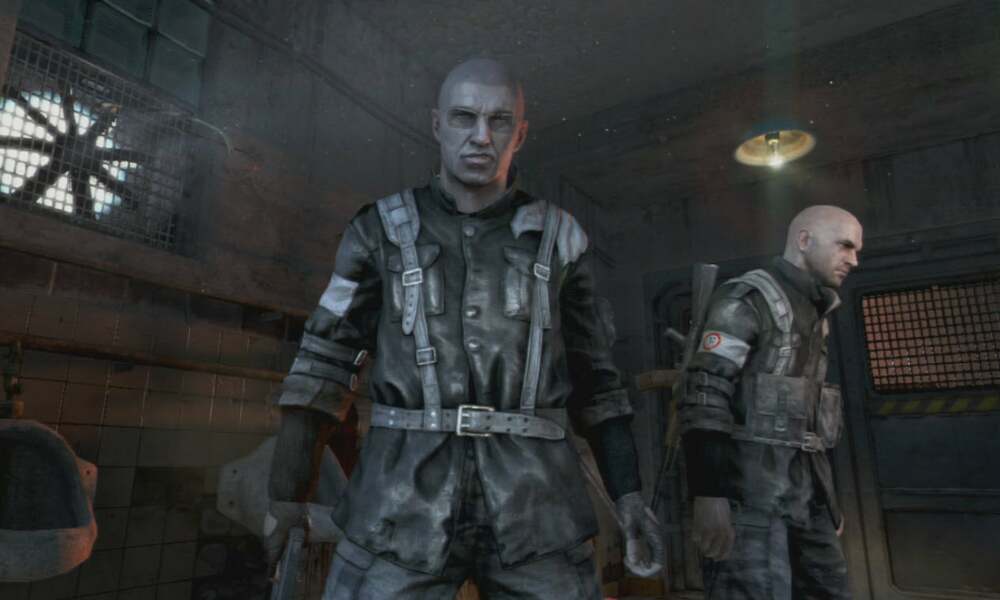
If the young Dark One is Artyom’s salvation, Pavel is a constant tempting damnation. It’s easy to love and hate Pavel. He helps you escape Nazi imprisonment, is an extra gun at your back, and is witty and clever and enthusiastic. Artyom even goes back to rescue him from bandits, despite the risk to his own mission.
And then he roofies you, reveals himself to a high ranking officer in the Red Party, and turns you over for interrogation and torture.
Nevertheless, he is a fascinating reflection of our protagonist. Pavel is an Artyom that never allowed himself to feel remorse for his actions or to doubt his orders. That’s not to say he doesn’t feel guilty for his betrayal, or trepidation for the actions he’s set to take. But he does believe so strongly in the cause that he’s willing to push past those hesitations, is willing to commit atrocities on innocents, is willing to overlook the skewed power dynamics of an organization whose main draw is erased lines between classes, all to ensure that communism becomes the dominant power in the underground.
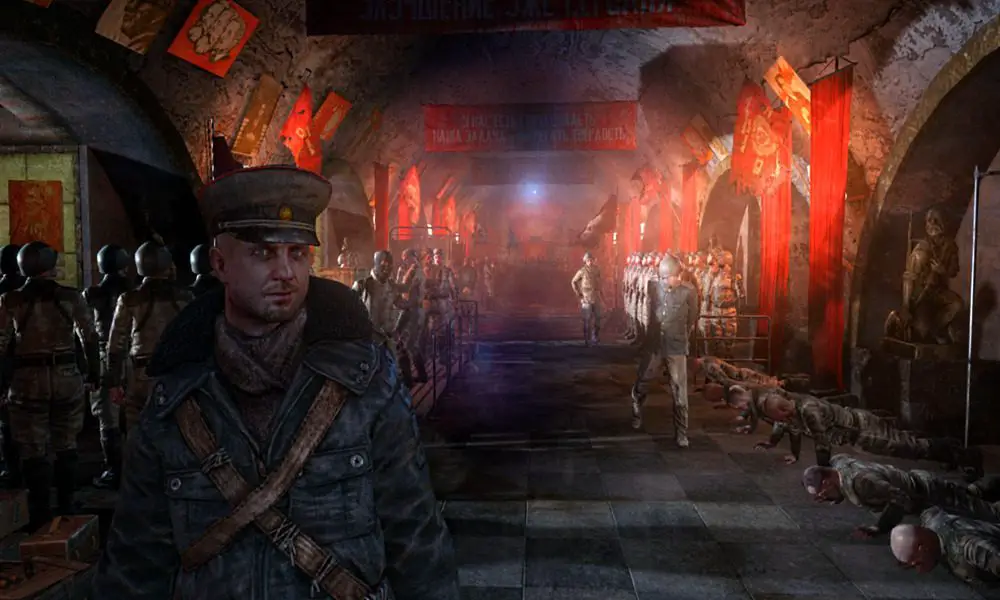
He’s almost tragically earnest in his desires and justifications. Pavel, unlike Artyom, doesn’t have the strength of will to take a stand against bad orders or actions he finds wrong. He is wholeheartedly an “ends justify means” sort of person, whereas Artyom is constantly ruminating on the moral rules he (or others) have bent or broken, constantly weighing his soul and whether each new task he must complete will leave it irrevocably stained.
The Redeemed Lights His Beacon
It’s this moral self-judgement, guided by a honed sense of justice, that turns Artyom into a real hero. He’s no longer simply a Spartan soldier—his actions propel him beyond his station. True, his name is not on every person’s lips. His deeds are not sung in taverns.
But he is a hero to every prisoner captured by Nazis. He is a hero to every Red Party soldier he spares. He is a hero to the child for whom he wins and returns the last gift from their father. He is a hero to the man begging for money to buy medicine. He is a hero to the family he rescues from bandits.
Artyom is a hero not because he was destined or prophesied or ordained to become one. He is a hero because he got to play the role of a villian, and not only found it did not suit him, but became determined to make up for it ever since.
Now I know there’s a whole other game to cover: the aforementioned Exodus. But honestly? There is so much to talk about: the characters, the DLC, environment, and choices. Exodus is an article in its own right, and one I intend to cover quite soon.
But in my opinion, Artyom’s character development, while not deficient in Exodus, really peaks in 2033 and Last Light. We see him at his best and his worst, a boy turned man trying to find himself amongst tunnels full of mutants and men. And we watch him grow, watch him learn, watch him take a fragment of fate in his own hands and become a hero in a world that desperately needs them.
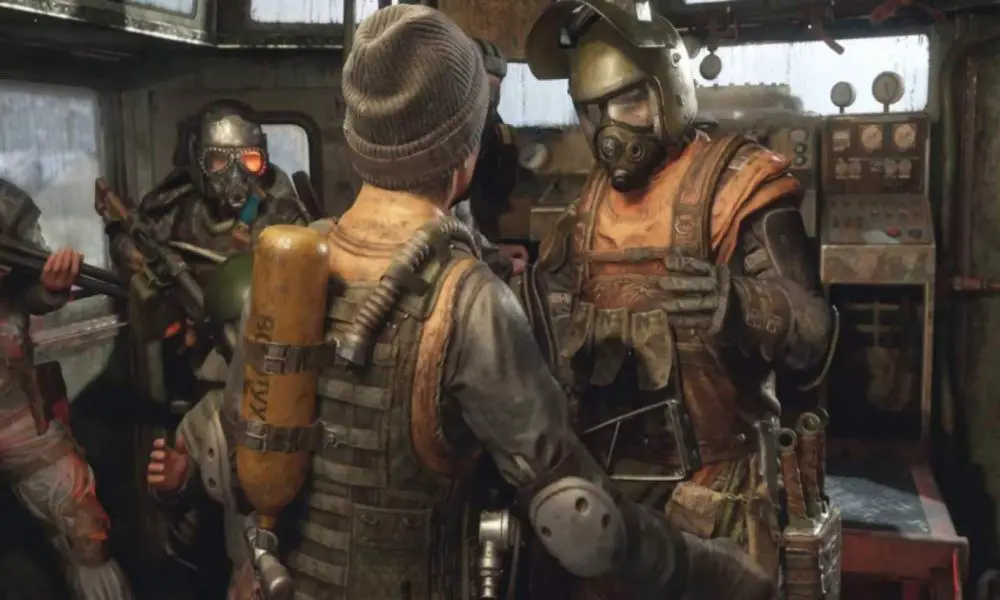
Images courtesy of Deep Silver
Have strong thoughts about this piece you need to share? Or maybe there’s something else on your mind you’re wanting to talk about with fellow Fandomentals? Head on over to our Community server to join in the conversation!

